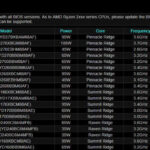AMD is working on its next-generation Zen 5 processors, which are expected to be the Ryzen 8000 desktop CPUs. According to a well-known leaker, these chips could bring groundbreaking advancements.
AMD has made it clear that it will not follow in Intel’s footsteps, as it does not plan to implement two-core configurations, such as the blue team’s P-cores and E-cores. The company has explained that the Zen 4C cores should not be considered as low-performance, high-efficiency cores (as is the case with Intel processors), as they are in fact not, but are very similar to the Zen 4 cores.

As for Zen 5, AMD has generated a lot of excitement, but there is still no confirmed information. Rumors continue to circulate and some offer some clarity on what we can expect from Zen 5, but as they are unconfirmed, they cannot be given full credibility. New information suggests that Zen 5 will have a significant jump in performance, higher than what we saw with Zen 2 to Zen 3.
Zen 5 IPC & Specs Are INCREDIBLE! Early Zen 6 Rumors & Sarlak Update
Ryzen 8000 to arrive next year
According to RedGamingTech (RGT), Zen 5 will offer a 20% improvement in IPC over Zen 4. In Zen 3, the IPC improvement over Zen 2 was 19%. In addition to this IPC-based performance increase, there is also the increase in frequencies to consider. If these increase between 200 and 300 MHz, the total single-threaded performance could increase by as much as 25% compared to Zen 4.
Zen 5 will keep the 8 cores and 16 threads per chiplet, and the Ryzen 9 8950X, which would be the new top-of-the-line, will feature a maximum of 16 cores and 32 threads. The chiplet will be configured with 32 MB of L3 cache, 80 KB of L1 cache per core and 1 MB of L2 cache per core. According to the latest rumors, Zen 5 is expected to be launched by the end of 2024.






